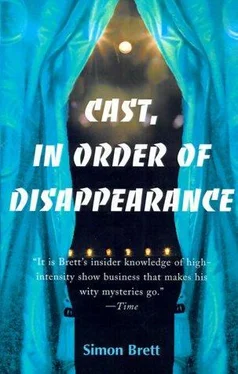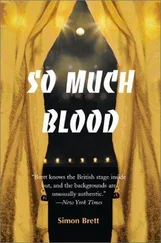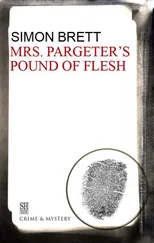Simon Brett - Cast in Order of Disappearance
Здесь есть возможность читать онлайн «Simon Brett - Cast in Order of Disappearance» весь текст электронной книги совершенно бесплатно (целиком полную версию без сокращений). В некоторых случаях можно слушать аудио, скачать через торрент в формате fb2 и присутствует краткое содержание. Жанр: Классический детектив, на английском языке. Описание произведения, (предисловие) а так же отзывы посетителей доступны на портале библиотеки ЛибКат.
- Название:Cast in Order of Disappearance
- Автор:
- Жанр:
- Год:неизвестен
- ISBN:нет данных
- Рейтинг книги:3 / 5. Голосов: 1
-
Избранное:Добавить в избранное
- Отзывы:
-
Ваша оценка:
- 60
- 1
- 2
- 3
- 4
- 5
Cast in Order of Disappearance: краткое содержание, описание и аннотация
Предлагаем к чтению аннотацию, описание, краткое содержание или предисловие (зависит от того, что написал сам автор книги «Cast in Order of Disappearance»). Если вы не нашли необходимую информацию о книге — напишите в комментариях, мы постараемся отыскать её.
Cast in Order of Disappearance — читать онлайн бесплатно полную книгу (весь текст) целиком
Ниже представлен текст книги, разбитый по страницам. Система сохранения места последней прочитанной страницы, позволяет с удобством читать онлайн бесплатно книгу «Cast in Order of Disappearance», без необходимости каждый раз заново искать на чём Вы остановились. Поставьте закладку, и сможете в любой момент перейти на страницу, на которой закончили чтение.
Интервал:
Закладка:
‘With some woman, ghastly actress…’
‘But ghastly. Marius was awfully upset. Nigel stayed away for two, three years…’
‘All of that, Bartlemas, all of that. Then he came crawling back
…’
‘Tail between his legs. Woman had left him…’
‘Who could blame her? Marius really did the prodigal son bit
…’
‘Oh yes, you couldn’t move in Orme Gardens for fatted calf. All the great reconciliation, my son, my son…’
‘It’s the Jewish character, you know. Love of the family. Terribly important to them.’
‘You’re right, O’Rourke. That’s what it is.’ This was pronounced with finality and followed by a breath pause. Charles, who was beginning to understand the technique of conversation with Bartlemas and O’Rourke, leapt in. ‘When was it this reconciliation took place?’
‘About five or six years ago,’ said Bartlemas.
‘Ah, that figures. It must have been then, in a final flush of family feeling, that he made everything over to Nigel.’
‘Yes.’
‘And, so far as one can tell, he regretted it ever after.’
‘Yes,’ said O’Rourke. There was a pause. ‘Jacqui,’ said Charles. ‘I didn’t know your middle name was Myrtle.’
XIII
The new will was passed over to Gerald Venables, who got in touch with Harold Cohn of Cohn, Jarvis, Cohn and Stickley, and the law began the grindingly slow processes on which it thrives. Charles thought that the whole affair was now out of his hands, and, though it was unsatisfactory that so many questions remained unanswered, at least some kind of justice had been done. Nigel got most of the estate, but would be more than a little embarrassed by estate duty; and provision for Jacqui and her baby would be sorted out in time. If the police persevered they were bound to crack Audrey Sweet’s defence and find out about the family blackmailing business. Then they had only to check through the photographs and the Sally Nash guest lists (which, as the case at the Old Bailey trickled on inexorably, were becoming public property anyway) to find their murderer. Charles even felt a twinge of pity for Mrs Sweet. She was a desperate woman, her incompetent attempts at blackmail motivated only by a desire to get as much money as possible in her new widowhood. It was now three days since Bill Holroyd had promised to bring her ten thousand pounds and by now she must realise the likelihood of his appearance was decreasing.
It was Saturday 15th December. Christmas was coming, but without much conviction in a darkened Britain. The cold shops with their sad gas-lamps were full of Christmas shoppers feeling sorry for themselves, and shoplifters having a field-day. The ever-present possibility of bombs made buying presents even jollier.
Charles rose late and managed to beat one of the Swedes into the bathroom. He returned to his room wrapped cosily in his towelling dressing-gown and sat in front of the gas-fire with a cup of coffee. Now that the excitements of the last fortnight were over, he would have to think again about getting some work. True, he’d got The Zombie Walks coming up, but that wasn’t going to make him a millionaire, and the old overdraft was getting rather overblown. Perhaps the answer was to write another television play. But, even if he could write the thing quickly, all the subsequent processes took such a bloody long time. Getting the thing accepted, rewritten, rewritten, rewritten, rehearsed, recorded, edited, scheduled, rescheduled, rescheduled, rescheduled ad infinitum. Not much likelihood of getting a commission either. Charles Paris wasn’t a big enough name these days. And no doubt, with the prospects of a three-day week and early closedown, none of the television companies would commit themselves to anything.
But as he tried to think of his work (Charles had long since ceased to grace it with the name of ‘his career’), his thoughts kept returning to the Steen situation. There was something fishy about the whole set-up. He tried to think himself into a detective frame of mind. What would Sherlock Holmes do in the circumstances? He would sit puffing on his pipe, Dr Watson goggle-eyed with admiration at his side, and suddenly, by a simple process of deduction, arrive at the complete solution. Somehow Charles Paris, sitting on his own in a towelling dressing-gown, hadn’t quite the same charisma. Or the same powers of deduction.
Reflecting sadly on his inadequacy, Charles rose to get dressed. He opened the dull grey wardrobe and pulled a pair of trousers off a hanger. As he did so, he noticed that there was a dark smudge on the seat. It smelled of petrol. He was about to put his trousers back and take out another pair, when a sudden thought stopped him in his tracks.
The trousers he was holding were the ones he’d been wearing at Streatley the previous weekend. And he must have got the mark on them when he slipped over in Steen’s garage. The scene came back to him with immediate clarity of detail. The enormous bulk of the blue Rolls illuminated by his torch, then suddenly his feet going from under him, slipping in a pool of petrol, landing on a spanner and a piece of tubing.
A piece of tubing. And the Rolls petrol gauge registered empty. Joanne Menzies’ words about the Datsun came back to him-‘It’s pretty good on petrol, but not that good. Might just about make it one way without registering, but certainly not both.’ But what was simpler than to drive the car to Streatley, siphon petrol out of the Rolls into it (possibly even siphon some into a can as well, to top it up near London) and then drive back? Charles decided that a visit should be paid to Mr Nigel Steen.
Joanne Menzies still looked drawn and strained when she ushered Detective-Sergeant McWhirter into Mr Steen’s office on the Monday afternoon. The policeman thanked her and stood deferentially until he was invited to sit down.
The man who made the invitation was very like his father, but without the vitality that had distinguished Marius Steen. Nigel had the same beak of a nose, but, without the dark eyes, its effect was comic rather than forceful. His eyes were blue, a legacy from the English rose whom Marius had married; and his hair was light brown rather than the black which his father had kept, only peppered with grey, until his death. The general effect was of a diluted Marius Steen, ineffectual and slightly afraid.
Nigel was ostentatiously smoking a big cigar to give an illusion of poise. He flashed Charles what was meant to be a frank smile. ‘Well, what can I do to help?’
‘I’m very sorry to bother you,’ said Detective-Inspector McWhirter slowly, ‘and I do very much appreciate your putting yourself out to see me. Particularly at what must be a very distressing time for you.’
‘That’s quite all right. What is it?’ With a hint of irritation, or was it anxiety?
‘I have already spoken to your secretary on the matter and she proved most helpful.’ Charles reiterated his lies about the theft in Pangbourne on the Saturday night.
‘But you see, since I spoke to her, we have had another witness’s account of having seen a yellow Datsun in the Goring area. And they identified your number plate. I mean, you can never trust members of the public; they are extraordinarily inaccurate in what they claim to remember, but I can’t discount anything. All I’m trying to do is to establish where your father’s Datsun was on that night, and then stop wasting your time.’
‘Yes.’ Nigel drew on the cigar and coughed slightly. He was clearly rattled. Not a man with a strong nerve, and certainly on the surface not one who could carry out a cold-blooded murder. He capitulated very quickly. ‘As a matter of fact, I was in Streatley in the Datsun on that Saturday night.’
Читать дальшеИнтервал:
Закладка:
Похожие книги на «Cast in Order of Disappearance»
Представляем Вашему вниманию похожие книги на «Cast in Order of Disappearance» списком для выбора. Мы отобрали схожую по названию и смыслу литературу в надежде предоставить читателям больше вариантов отыскать новые, интересные, ещё непрочитанные произведения.
Обсуждение, отзывы о книге «Cast in Order of Disappearance» и просто собственные мнения читателей. Оставьте ваши комментарии, напишите, что Вы думаете о произведении, его смысле или главных героях. Укажите что конкретно понравилось, а что нет, и почему Вы так считаете.












